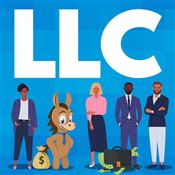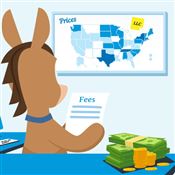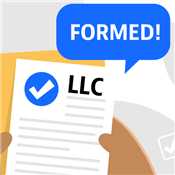What is a DBA
Getting a DBA can be beneficial for your business. But do you really need one? Learn more about what a DBA is here.
 |
A DBA offers you more flexibility and freedom with your business name choice. This can give your business a distinct identity that customers can easily remember.
But a DBA isn't necessary for every business. You can still start and operate a company without getting a DBA.
Does your business need one?
Find out everything there is to know about a DBA, its benefits, and how to register one in this article.
What Does DBA Mean?
A DBA, or "Doing Business As," allows businesses to operate under a name different than registered in their official documents. Just think of it as your business' official nickname.
It's also known by the following terms:
- Trade name
- Fictitious name
- Assumed name
Like your official business name, you'll have to register a DBA with your state. But you only need a DBA if you want to do business under a different name. So if you're operating under your business' official business name, you won't need a DBA.
Here's an example of how it works:
Let's say your officially registered business name is "Jane Smith's Bakery." But you want to open a shop called "Jane's Baked Delights" instead.
You can get a DBA to operate under the second name legally. But all your official business documents will still reflect the original name. If your shop is called "Jane Smith's Bakery," you won't need to file for a DBA.
Besides that, there are a few other reasons a business would want a DBA name. You can read more about it in the "Why Get a DBA" section.
Who Needs a DBA?
Not every business needs a DBA to operate. But they can still get one if they need it.
Sole Proprietorships and Partnerships
Sole proprietors must register their own name as their business' name. Partnerships need to include all the owners' last names in their registered business name. A DBA will allow them to operate under a different business name.
For example, a sole proprietor named John Smith can call his landscaping business "Evergreen Lawn Services" with a DBA. This lets him have a catchier name and avoids using his personal name.
LLCs and Corporations
These business structures don't need a DBA but can still get one. They usually get a DBA when opening new franchises or marketing new products. A DBA is less costly and easier to register than forming a new entity or getting a business name change.
For example, if you're an LLC marketing a new product lineup under a new brand, you can get a DBA. This lets you create the new brand without getting a name change or forming a new entity.
If you want liability protection for each, forming separate LLCs is still better. Some states even allow business owners to form Series LLCs. Each series under the parent company has its own personal liability protection.
Why Get a DBA?
Here are some of the benefits of a DBA:
Legal Compliance
You need to register a DBA with your state or local office if you're not using your official business name. This is to protect your business and its customers from potential legal problems.
The government can still trace the company back to you and hold you accountable for any wrongdoing. At the same time, customers can't sue your business for fraud if it has a registered DBA.
Personal Privacy
A DBA allows you to choose the exact name you want to do business under. You no longer have to use your personal name as your business name if you're a sole proprietor. This minimizes the risks to your privacy and personal information.
Business Branding and Expansion
You can use a different business name with a DBA, which can be helpful for your company's marketing strategies. That's because you can choose something catchier and more creative. A DBA can also benefit you when creating more targeted ad campaigns.
Besides that, you can use a more authoritative name with a DBA. This can boost your business' credibility, especially if you're a sole proprietor. It'll also make it easier for customers to trust and remember your company.
This is especially true for companies branching out into a new market or product. You can use a DBA to connect the new products to the parent company while emphasizing their difference.
Customers expect significantly new features when a company changes its name. But brand recognition is still an important driving force behind a buyer's decision.
Around 71% of consumers prefer buying from a brand they know or recognize. This is also true for approximately 82% of investors.
Banking Privileges
If you're a sole proprietor, you can choose to open a business bank account with your DBA name. A DBA will allow you to receive and make payments using your preferred business name instead of your own name.
This is ideal for business owners who want to separate their personal and business finances but aren't ready to formalize their business structure yet.
DBA vs. LLC
Even though you need to register it, a DBA is not a business structure. A DBA just allows companies to use a different business name.
An LLC, on the other hand, is a business structure and has personal liability protection. That means you don't have to worry about losing your house, car, and other properties if your business experiences legal or financial issues.
One advantage of a DBA is that its registration is generally easier and less expensive than forming an LLC. You just need to fill up the right forms and pay the filing fees. In some areas, you can just file your DBA with the county or city office instead of the state.
A DBA is easier to get started if you're just a single business owner. You can always change it to an LLC when you're ready to grow your business.
DBA vs. Sole Proprietorship
A sole proprietorship is an informal business structure that doesn't require registration with the state. Anyone can start a business as a sole proprietor. Meanwhile, you have to register a DBA even if it's not a business structure.
DBAs and sole proprietorships don't have personal liability protection because they're not considered separate legal entities. You could still lose your personal assets if your business encounters legal or financial trouble.
Sole proprietors use their personal name as their legal business name. But you can get a DBA if you want to do business under a different name.
They can also open a business bank account under their DBA name instead of their own. This lets you look more professional by having your business name on your debit card, checks, etc.
DBA vs. S Corporation
Like a DBA, an S corporation is not a business structure. An S corporation is a tax classification designed to reduce the taxes that companies have to pay. Both LLCs and corporations can choose this tax classification.
An S corp tax status eliminates double taxation for corporations. They don't have to pay taxes on the same income twice.[1] It also lowers self-employment taxes for LLC members because they're considered employees instead of owners.
S corporations typically have liability protection because LLCs and corporations are considered separate entities. A DBA business won't have this protection if it's not an LLC or corporation.
Another difference is that any business can get a DBA, including sole proprietorships. But only partnerships, LLCs, and corporations can choose an S corp classification.
DBA vs. Trademark
A trademark protects your intellectual property and gives you exclusive rights over your chosen business name. This means only your business can use the name as its own, including all titles, symbols, and words in the trademarked name.[2]
You can also ask anyone who uses your business' trademarked name to stop. They'll have to deal with the legal consequences if they don't.
DBAs are also only filed at the state level, so any naming rights only apply within the state. But other businesses might still be able to claim it as their own if your state doesn't offer exclusive naming rights for DBAs.
Only Alaska and North Dakota give businesses exclusive rights to their registered DBA names.[3][4]
Trademarks can be filed on both state and federal levels. This gives you nationwide protection for your business name.
A DBA also expires after 5 years, while a trademark doesn't. If you want to continue using your DBA, you have to refile it after it expires. For trademarks, you just have to show you're continuously using them.
One advantage of DBAs is that they're quicker and less expensive to register than trademarks. A DBA usually takes 1 to 4 weeks to process and only costs up to $100 in most states. Meanwhile, a trademark can take a few months to a few years and cost up to $500 or more.
How to Register Your DBA Name
Here are the general steps you need to follow.
Choose Where to Register
You first need to decide where you'll register your DBA. In most cases, businesses need to file their DBA application in the state where they're operating or registered.
You also need to register your DBA name in other states if you plan to use it there.
Check Your DBA Name's Availability
State guidelines for DBA names are usually more relaxed than official business names. You usually just have to do the following.
- No other business in the state is using/has registered your preferred name.
- It follows standard naming guidelines (e.g., no profanity, doesn't promote illegal activity, doesn't imply a connection to the government, etc.)
- It shouldn't be too similar to the names of existing businesses in the area.
You can check your state's online database to check if your preferred name is still up for grabs.
Register Your DBA
The specific filing forms differ in every state. Make sure you double-check which ones you need before you file your application.
Once you have all the requirements, you can file your application with the correct department. Make sure you know where to file it since it's not the same in every jurisdiction.
Some areas require you to file it with the Secretary of State's office. Others ask you to file it with the city or county office. Third-party services can also file your DBA application for you.
Aside from that, you also have to pay the filing fees, which range from $10 to $100.
| States with No State Filing Requirements for DBAs | |
|---|---|
| Alaska | Alabama |
| Arizona | Delaware |
| Florida | Hawaii |
| Kansas | Maryland |
| Mississippi | New Mexico |
| Nebraska | Ohio |
| Wisconsin | Wyoming |
Meet Other Requirements
Some states have publication requirements when a business registers a DBA. This means you must announce your business' new alias in a state-approved local newspaper. You can also announce it in a legal publication in your area.
Make sure you check beforehand if it's part of your registration state's requirements to ensure you're compliant.
FAQs
How to file taxes with a DBA?
That will depend on your specific business structure. Sole proprietorships and partnerships with DBAs need to file their business taxes as part of their personal income tax returns (pass-through taxation).
Corporations with a DBA must file their taxes twice - once on a corporate level and another on a personal income level. LLCs with a DBA can choose how they want to be taxed (sole proprietorship/partnership, C corporation, or S Corporation).[5]
Can two businesses have the same DBA?
No, they can't. Like regular business names, a DBA should be unique to the business using it. No other company in the state can use the DBA as its own.
Can I open a business bank account with a DBA?
Yes, you can. Sole proprietors can open a business bank account with a DBA. That lets you do banking with your DBA name instead of your own name. LLCs and corporations can open an account without a DBA.
Can I have a DBA on my EIN?
No, you can't. The name indicated on your EIN should be your officially registered business name. But you still need to report your DBA to the IRS if you have one.
Does a DBA have an expiry date?
Yes, it does. A DBA only lasts five years. After that, you need to renew your registration to continue using it.
What the Experts Say
CreditDonkey asked a panel of industry experts to answer readers' most pressing questions. Here's what they said:
Bottom Line
Businesses don't really need a DBA to operate. But it can offer many benefits to business owners, especially sole proprietors. It gives you better privacy and flexibility when it comes to your business name. This can also help establish your credibility among your customers.
LLCs and corporations can also benefit from a DBA if they plan to expand or diversify their offers. You can adjust your business name with a DBA to make more effective marketing strategies.
Just remember that a DBA alone doesn't offer you liability protection like an LLC or corporation would.
References
- ^ Internal Revenue Service. S Corporations, Retrieved 10/29/2022
- ^ USPTO. What is a trademark?, Retrieved 10/29/2022
- ^ State of Alaska. Business Licensing - Select a Business Name, Retrieved 10/29/2022
- ^ North Dakota Secretary of State. Trade Name / Franchise Name, Retrieved 10/29/2022
- ^ Internal Revenue Service. Taxation of Limited Liability Companies, Retrieved 10/29/2022
Write to Alyssa Supetran at feedback@creditdonkey.com. Follow us on Twitter and Facebook for our latest posts.
|
|
| ||||||
|
|
|












